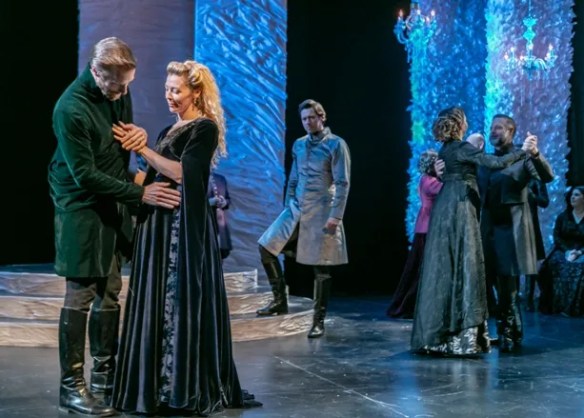
The Shakespeare Theatre of New Jersey’s new production of the N. Richard Nash hit The Rainmaker is an apt thematic fit for a summer this hot, where land and spirits are parched. STNJ’s artistic director Bonnie J. Monte directs the show, preserving all its comedy and charm, which opened August 3 and runs through August 18.
In the early 1950s, somewhere Out West, the Curry family ranch is in trouble. A severe drought imperils the cattle herd, and tempers are frayed. Father H.C. Curry (Mark Elliot Wilson), older son Noah (Benjamin Eakeley), and younger son Jim (Isaac Hickox-Young) are preoccupied not only with the lack of rain but with their clumsy attempts to interest someone—anyone?—in marrying their sister Lizzie (Monette Magrath). A visit to the office of Sheriff Thomas (Nick Plakias) to inveigle his deputy, File (Corey Sorenson), to come to dinner—a fix-up ploy File sees through immediately—fails miserably. Noah counsels Lizzie to act more like the mincing, flattering kind of woman who, though vapid and undignified in Lizzie’s view, gets her man nonetheless. His and her imitation of how she should behave provides a number of hearty audience laughs.
Just when the family’s situation seems bleakest, with their prospects as empty as the sky is empty of clouds, flamboyant Billy Starbuck (Anthony Marble) appears at their door, claiming to be a rainmaker. All he needs is $100. As ranch manager, Noah wants to run him off the property; Lizzie calls him a con man and a liar. Only Jim, naïve enough to see the world through the lens of hope and H.C., desperate enough to try anything and astute enough to see something in Starbuck that might broaden Lizzie’s horizons, want him to stay. What can be the outcome of such a reckless and costly venture?
All the Currys are well portrayed, with Magrath especially poignant and frustrated as Lizzie, facing what Noah claims is certain spinsterhood. Hickox-Young is delightful as the credulous, mercurial Jim, quick to take offense and as quick to forgive. Eakeley plays the over-practical Noah with a hard edge, while secretly yearning for relief from the burdens of the ranch and the family. And Wilson as H.C. manages to be simultaneously indulgent and strong.
In a sense it is Marble’s show when he is on stage, because his showman character is so unpredictably over-the-top, yet the actor conveys heart-warming tenderness when dealing with Lizzie, and Magrath is equally engaging in their scenes together.
The script holds up some 65 years after being written and retains its comedic as well as romantic luster. It’s easy to see why this strong and moving story has been revived on stage, made into a movie, and repackaged as a musical (110 in the Shade).
Shakespeare Theatre of New Jersey productions are hosted at Drew University in Madison, N.J. (easily reachable from NYC by train). For tickets, call the box office at 973-408-5600 or visit the Box Office online. Note that STNJ offers special ticket pricing of $30 for theatergoers under age 30!











